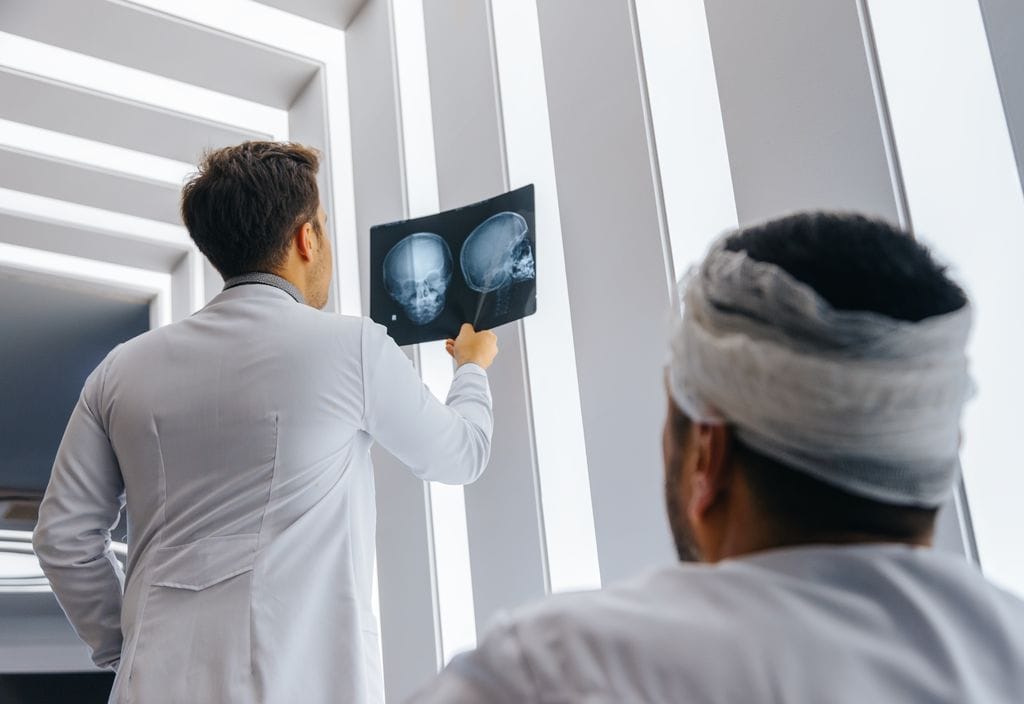Common Car Accident Injuries
Car accidents, unfortunately, are a common occurrence on our roads, leading to a range of injuries that can vary in severity. Unfortunately, serious injuries are often the result of auto accidents. The impact of a car accident can be far-reaching, affecting not just the physical but also the psychological well-being of those involved. In the aftermath of such incidents, understanding the common types of injuries that can occur is crucial for effective diagnosis, treatment, and recovery.
If you were injured in a car accident caused by another driver’s negligence, you may be able to seek compensation for your injuries and damages. The car accident lawyers of Doehrman Buba Ring can help you navigate the complex legal process and fight for your rights. Contact us today for a free consultation.

The Most Common Car Accident Injuries Are:
- Bruising
- Whiplash
- Brain Injuries
- Chest Injuries
- Spinal Cord Injuries and Paralysis
- Internal Bleeding
- Soft Tissue Injuries
- Broken Bones
- Post-Traumatic Stress Disorder (PTSD)
Bruising
Bruises are among the most frequent injuries following a car accident, typically resulting from the forceful impact against seat belts, airbags, or parts of the vehicle’s interior. Although often considered minor, bruises can sometimes indicate more severe internal injuries. Thus, it’s essential to monitor the severity and duration of bruising closely. In many cases, bruises will heal on their own, but persistent or unusually large bruises should be evaluated by a healthcare professional to rule out underlying issues.
Whiplash
Whiplash is a neck injury that occurs when the head is suddenly jerked forward and then backward, mimicking the motion of a whip. This type of injury is exceptionally common in rear-end car accidents and can vary greatly in severity. Symptoms of whiplash may include:
- neck pain and stiffness,
- headaches,
- dizziness,
- and sometimes blurred vision or fatigue.
While some individuals recover from whiplash within a few weeks with proper medical treatment and rest, others may experience chronic neck pain and other long-lasting complications. It’s crucial for anyone suspecting they have whiplash to seek medical attention to ensure a proper diagnosis and treatment plan.

Brain Injuries
Brain injuries resulting from car crashes can be some of the most severe and life-altering injuries an individual can sustain. They range from mild concussions, which may only require short-term care, to traumatic brain injuries (TBIs) that can lead to long-term cognitive, emotional, and physical impairments.
The symptoms of a brain injury might not be immediately apparent and can manifest days or even weeks after the accident. They include:
- Persistent headaches
- Loss of consciousness
- Confusion
- Memory loss
- Mood swings
- Sleep disturbances
- Blurred Vision
Given the complexity and potential severity of a traumatic brain injury, it’s paramount for car accident victims who have experienced a head impact in a car accident to seek medical evaluation as soon as possible. Early diagnosis and treatment can significantly improve the prognosis and recovery outcomes for those affected.
Chest Injuries
Chest injuries in car accidents can range from mild to life-threatening and often occur due to the forceful impact of the seat belt during the collision. While seat belts are critical for protecting passengers, they can also cause injuries such as bruising, rib fractures, or more severe internal chest injuries.
One notable indicator of a seat belt’s force during a crash is the “seat belt sign,” characterized by visible bruising along the path of the seat belt. This sign is not only indicative of surface damage but may also suggest underlying injuries to chest organs, such as the heart and lungs.
Symptoms of chest injuries may include:
- pain,
- difficulty breathing,
- and tenderness in the chest area.
It’s essential for anyone experiencing these symptoms after a car accident to seek immediate medical attention, as some chest injuries can be life-threatening if not promptly addressed.
Arm and Leg Injuries
Arm and leg injuries in car accidents are commonly caused by the force of the impact or by being crushed in a collision. These injuries can range from minor scrapes and bruises to severe fractures, dislocations, or loss of limbs. Symptoms often include pain, swelling, and difficulty moving the affected limb. Prompt medical attention is crucial for proper diagnosis and treatment.
Knee Injuries
Knee injuries are a frequent outcome of car accidents, occurring when the force of the crash causes the knee to strike the dashboard, door, or other hard surfaces within the car. These injuries can range from minor, such as bruises and minor sprains, to more serious conditions, like fractures, anterior cruciate ligament (ACL) injuries, or meniscus tears. Symptoms commonly associated with knee injuries from car accidents include pain, swelling, instability, and difficulty in bearing weight or walking. Early assessment and treatment by a healthcare professional are vital to manage the pain and facilitate proper healing, potentially preventing long-term damage or disability.
Spinal Cord Injuries and Paralysis
Spinal cord injuries are among the most devastating consequences of car accidents, often resulting from severe impacts that fracture or dislocate the vertebrae. The spinal cord, being the main pathway for communication between the brain and the rest of the body, can lead to a wide range of functional impairments when damaged, depending on the injury’s location and severity. Spinal cord injuries are typically classified into two main types: complete and incomplete. A complete injury means there is no sensory or motor function below the level of the injury, whereas an incomplete injury might retain some level of function.
Complete Paralysis (Tetraplegia/Quadriplegia)
Complete paralysis, also known as tetraplegia or quadriplegia, occurs when the injury to the spinal cord is so severe that it results in the total loss of muscle function and sensation in the trunk, legs, and arms. This type of paralysis affects all areas below the neck, and individuals with tetraplegia often require comprehensive, lifelong assistance and care.
Incomplete Paralysis (Paraplegia)
Incomplete paralysis, or paraplegia, is characterized by the partial loss of movement or sensation below the injury site. People with paraplegia may retain some degree of voluntary motor function or sensation in the affected areas. The extent of mobility and sensory function depends on the level of the spinal injury and its severity.
Internal Bleeding
Internal bleeding is a critical condition that can occur following a car accident, often resulting from the blunt trauma associated with the impact. Unlike external injuries that are visibly apparent, internal bleeding can remain hidden and may not show symptoms immediately, making it particularly dangerous.
The symptoms of internal bleeding may vary depending on the injury’s location but can include:
- abdominal pain,
- weakness,
- dizziness,
- and a feeling of faintness or actually fainting due to blood loss.
In more severe cases, internal bleeding can lead to shock or even death if not promptly treated. Due to the potential severity and the challenging nature of diagnosing internal bleeding, it’s imperative for anyone involved in a serious car accident to receive a thorough medical examination as soon as possible, even if no injuries are immediately apparent.
Soft Tissue Injuries
Soft tissue injuries are among the most common outcomes of car accidents, affecting the muscles, ligaments, and tendons. These injuries might not be immediately obvious post-accident but can cause significant pain and discomfort over time.
Types of soft tissue injuries include sprains, strains, and contusions, which are often the result of the body being jerked or strained during the collision. Whiplash itself is a type of soft tissue injury that primarily affects the neck and upper back.
Symptoms of soft tissue injuries can vary but typically include:
- swelling,
- pain at the injury site,
- bruising,
- and limited range of motion.
While many soft tissue injuries heal with time and proper care, including rest, ice, compression, and elevation (RICE), it’s crucial for accident victims to get a medical evaluation to rule out more serious conditions and receive guidance on effective treatment strategies.
Broken Bones
Broken bones are a frequent and serious injury resulting from car accidents. The force exerted during a collision can easily fracture the fragile structure of bones, particularly those in the arms, legs, and ribcage. Fractures can vary significantly in severity, from simple breaks that may heal with the aid of a cast to complex fractures that require surgical intervention and extensive rehabilitation.
Symptoms of a broken bone include:
- intense pain,
- swelling,
- bruising,
- and an inability to move the injured area.
In more severe cases, the bone may protrude through the skin, a condition that demands immediate medical attention to prevent infection and ensure proper healing.
The recovery time for broken bones can vary, depending on the bone’s location, the type of fracture, and the patient’s overall health.

Post-Traumatic Stress Disorder (PTSD)
Post-Traumatic Stress Disorder (PTSD) is a mental health condition that’s triggered by witnessing or experiencing a traumatic event, such as a severe car accident. Symptoms of PTSD can vary widely but often include flashbacks, nightmares, severe anxiety, and uncontrollable thoughts about the event. Individuals with PTSD may also experience an intense, persistent sense of fear, sadness, and detachment from others, which can interfere with their daily functioning and relationships.
It’s not uncommon for those recovering from a traumatic crash to develop fears of driving or riding in vehicles, further impacting their quality of life. Diagnosis and treatment are essential for managing PTSD, with options that include therapy, medication, and support groups designed to help individuals process their trauma and develop coping strategies.
Recognizing the signs of PTSD and seeking professional help are crucial steps toward recovery for those affected by the psychological aftermath of car accidents.
What Should You Do If You Are Injured In a Car Accident?
If you are injured in a car accident, taking the right steps immediately can significantly impact your health and legal rights. Follow this list to ensure you are protected:
Ensure Your Safety: First, move to a safe location, if possible, to avoid any further injuries.
Call 911: It’s crucial to report the accident and request medical assistance if there are any injuries.
Seek Medical Attention: Even if your injuries seem minor, symptoms can appear or worsen later. A medical professional can provide a thorough evaluation.
Gather Information: Collect details from the other driver(s), including their name, contact information, insurance details, and vehicle registration number. If there are witnesses, obtain their contact information as well.
Document the Scene: Take photographs of the accident scene, your injuries, and all vehicles involved. This can be vital evidence for insurance claims or legal actions.
Notify Your Insurance Company: Inform your insurance provider about the accident as soon as possible. Be honest about the incident, but avoid admitting fault until all facts are known and you’ve spoken to a lawyer.
Keep a Record: Document all medical treatments, keep track of any related expenses, and log any missed work or activities due to your injuries.
Avoid Immediate Settlement Offers: Be wary of quick settlement offers from insurance companies. Ensure you understand the full extent of your injuries and related costs before agreeing to any settlement.
Consult with an Attorney: Consider speaking with a personal injury attorney experienced in car accident cases. They can provide advice on securing compensation for your injuries and losses.
Follow-Up on Treatment Plans: Adhere to any treatment plans and follow-up appointments recommended by medical professionals to ensure proper recovery.
Taking these steps can help safeguard your health and legal rights after a car accident.

Pursue Justice With Doehrman Buba Ring
Car accidents often cause severe injuries with long-lasting physical, emotional, and financial repercussions. If your car accident injury was caused by another driver’s negligence or recklessness, it’s essential to seek justice and compensation for your losses.
At Doehrman Buba Ring, we have over 45 years of experience representing individuals throughout Indiana in personal injury cases, including those involving car accidents. Our team is dedicated to fighting for the rights of accident victims and helping them secure the compensation they deserve.
Don’t face this challenging time alone. Contact the Indiana car accident lawyers at Doehrman Buba Ring today for a free consultation to discuss your case and explore your legal options. We are committed to providing compassionate, personalized representation and will work tirelessly to achieve a favorable outcome for you.


